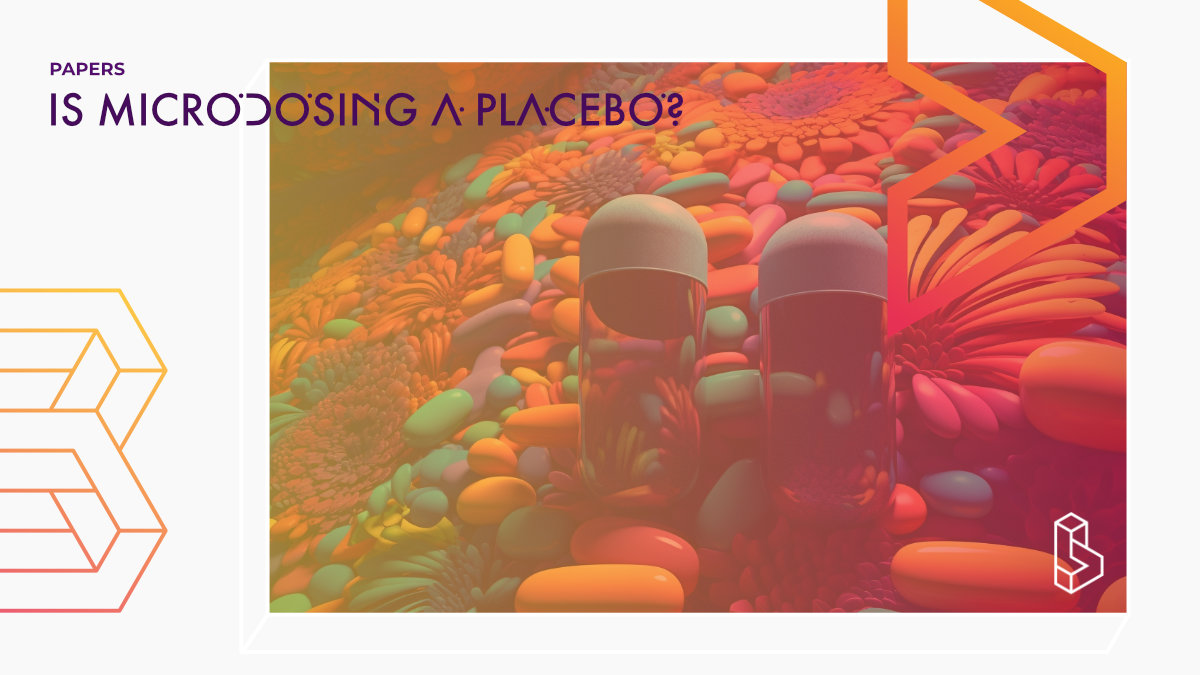This review (2024) critically assesses the available evidence from dose-controlled studies investigating low doses of LSD and psilocybin. It proposes eight potential issues, such as small sample sizes, a limited number of controlled studies, and the possibility of selection bias, that challenge the claims that microdosing is predominantly a placebo effect. It suggests that it is currently inconclusive whether microdosing is merely a placebo.
Abstract of Is Microdosing a Placebo?
“Some recent research and commentary have suggested that most or all the effects reported by people who microdose psychedelics may be explained by expectations or placebo effects. In this rapid review, we aimed to evaluate the strength of evidence for a placebo explanation of the reported effects of microdosing. We conducted a PubMed search for all studies investigating psychedelic microdosing with controlled doses and a placebo comparator. We identified 19 placebo-controlled microdosing studies and summarised all positive and null findings across this literature. Risk of bias was assessed using the Cochrane risk-of-bias tool for randomised trials. The reviewed papers indicated that microdosing with LSD and psilocybin leads to changes in neurobiology, physiology, subjective experience, affect, and cognition relative to placebo. We evaluate methodological gaps and challenges in microdosing research and suggest eight reasons why current claims that microdosing is predominately a placebo are premature and possibly wrong: (1) there have been only a small number of controlled studies; (2) studies have had small sample sizes; (3) there is evidence of dose-dependent effects; (4) studies have only investigated the effects of a small number of doses; (5) the doses investigated may have been too small; (6) studies have looked only at non-clinical populations; (7) studies so far have been susceptible to selection bias; and (8) the measured impact of expectancy is small. Considering the available evidence, we conclude that it is not yet possible to determine whether microdosing is a placebo.”
Authors: Vince Polito & Paul Liknaitzky
Summary of Is Microdosing a Placebo?
Microdosing became popular around 2015, with thousands experimenting with this novel way of using psychedelics. There is still little scientific knowledge about the effects, mechanisms, or risks of regular use of psychedelic drugs at low doses.
Early microdosing studies reported positive effects on mental health, well-being, cognition, personality, changes in conscious state, and physiological changes.
Find this paper
Is microdosing a placebo? A rapid review of low-dose LSD and psilocybin research
https://doi.org/10.1177/02698811241254831
Open Access | Google Scholar | Backup | 🕊
Cite this paper (APA)
Polito, V., & Liknaitzky, P. (2024). Is microdosing a placebo? A rapid review of low-dose LSD and psilocybin research. Journal of Psychopharmacology, 02698811241254831.
Study details
Compounds studied
Psilocybin
LSD
Placebo
Topics studied
Microdosing
Study characteristics
Literature Review
Authors
Authors associated with this publication with profiles on Blossom
Vince PolitoVince Polito is a Senior Research Fellow in the School of Psychological Sciences, and a member of the Biomolecular Discovery Research Centre at Macquarie University.
Paul Liknaitzky
Dr Paul Liknaitzky is Head of the Clinical Psychedelic Lab, and Senior Research Fellow within the Dept of Psychiatry at Monash University. He has played a central role in establishing the field of clinical psychedelic research in Australia, and is the Principal Investigator on a program of psychedelic trials.
Linked Research Papers
Notable research papers that build on or are influenced by this paper
The emerging science of microdosing: A systematic review of research on low dose psychedelics (1955 – 2021)This preprint (2021) review is one of the most comprehensive reviews on microdosing to date. The reviewers report effects across six categories; mood and mental health; wellbeing and attitude; cognition and creativity; personality; changes in conscious state; and neurobiology and physiology. Studies showed a wide range in risk of bias and argue that the idea that the effects of microdosing are due to expectancy is possibly wrong.

